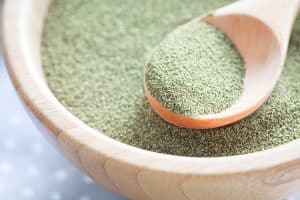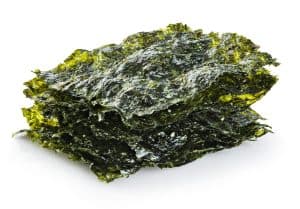Understanding the Benefits and Uses of Seaweed for Your Pet
Did you know that kelp, a nutrient-rich type of seaweed, can offer incredible health benefits for your furry friend? In this blog post, we will dive into the fascinating world of sea kelp and explore the question, “Is kelp good for dogs?” We will discuss how this marine superfood can support your dog’s well-being, from boosting immunity to promoting healthy skin and coat. So, let’s embark on this exciting journey of discovering the power of kelp for dogs!
Key Takeaways
- Kelp is a nutritious sea vegetable that offers essential vitamins, minerals and antioxidants for dogs.
- It can help improve immunity, reduce inflammation, support skin & coat health and strengthen dental health.
- Incorporating kelp into your dog’s diet safely with the correct supplement dosage will maximise its benefits while monitoring for side effects.
The Nutritional Power of Kelp for Dogs

Kelp is a true superfood among sea vegetables, offering an impressive array of vitamins, minerals, and antioxidants that can benefit your dog’s health. As a natural source of protein, amino acids, and vitamins, sea kelp is often deemed more beneficial than land plants, making it an excellent addition to your dog’s diet.
But what makes sea kelp so special? Let’s venture beneath the waves and unveil the nutritional prowess hidden in this aquatic gem.
Understanding Kelp: Seaweed’s Superfood

Kelp, also known as sea kelp, is a brown seaweed that thrives in lush underwater forests up to a depth of 40 meters in crystal-clear water. Sea kelp is such a potent source of more than 60 essential nutrients, including:
- 25% protein
- 2% fat content
- Trace elements
- Minerals
- Vitamins
So, how much kelp should you incorporate into your diet? The answer depends on your individual nutritional needs and preferences. However, be cautious not to consume too much kelp; moderation is key to a balanced, healthy diet.
These nutrients benefit your dog’s overall health, improve their energy levels, and help them maintain a healthy weight. In fact, kelp can even be helpful for dogs with skin allergies and dermatitis, reducing redness, itching, and irritation and providing much-needed relief.
The Importance of Iodine in Kelp
One key nutrient in sea kelp is iodine, essential for maintaining healthy thyroid function in dogs. The thyroid gland produces thyroid hormones that regulate healthy metabolism, and iodine plays a crucial role in this process.
Sufficient iodine in a dog’s diet can improve metabolism, healthy thyroid function, and other positive outcomes, even for senior dogs. So, by adding kelp to your dog’s diet, you can also prevent iodine deficiency while providing them with a nutrient-rich superfood and support their thyroid health.
Why Should Dogs Avoid Eating Wild Seaweed?
When taking your dog to the beach, it’s crucial to ensure they steer clear of wild seaweed. Here’s why:
- High Salt Content: Wild seaweed often contains excessive amounts of salt. Ingesting it can put your dog at risk of salt toxicosis, a condition that can lead to severe health issues.
- Intestinal Blockage: The long, fibrous strands of seaweed can get tangled and lodged in your dog’s intestines, causing serious gastrointestinal blockages that may require surgery to resolve.
- Hidden Dangers: Wild seaweed can harbour hidden animals or parasites that, if ingested, can cause infections or other health problems for your dog.
- Expansion in Stomach: Dried seaweed has the potential to expand once it’s inside your dog’s stomach. This expansion can lead to digestive issues like vomiting, diarrhoea, and even bowel obstructions.
Symptoms to watch for include vomiting, diarrhoea, weakness, and lethargy. Should your dog consume wild seaweed, consulting a veterinarian immediately is essential to prevent more serious complications.
Why Should Dogs Avoid Eating Wild Seaweed?
When taking your dog to the beach, it’s crucial to ensure they steer clear of wild seaweed. Here’s why:
- High Salt Content: Wild seaweed often contains excessive amounts of salt. Ingesting it can put your dog at risk of salt toxicosis, a condition that can lead to severe health issues.
- Intestinal Blockage: The long, fibrous strands of seaweed can get tangled and lodged in your dog’s intestines, causing serious gastrointestinal blockages that may require surgery to resolve.
- Hidden Dangers: Wild seaweed can harbour hidden animals or parasites that, if ingested, can cause infections or other health problems for your dog.
- Expansion in Stomach: Dried seaweed has the potential to expand once it’s inside your dog’s stomach. This expansion can lead to digestive issues like vomiting, diarrhoea, and even bowel obstructions.
Symptoms to watch for include vomiting, diarrhoea, weakness, and lethargy. Should your dog consume wild seaweed, consulting a veterinarian immediately is essential to prevent more serious complications.
Health Benefits of Kelp for Canines

As we’ve learned, sea kelp is a potent source of essential nutrients that can offer numerous health advantages for dogs. But what exactly are these benefits?
Next, we’ll explore how kelp can enhance immunity, mitigate inflammation, promote skin health and coat shine, and improve dental health in our furry friends.
Boosting Immunity and Reducing Inflammation
Kelp’s antioxidants and nutrients, such as:
- Carotenoids
- Ascorbic acid (vitamin C)
- Various enzymes
- Unsaturated fatty acids
Kelp helps strengthen the immune system and reduce inflammation in dogs. Additionally, it encourages the production of beneficial bacteria in a dog’s gut microbiome, which aids in restoring balance and reinforcing the immune system.
Its iodine content can also help reduce inflammation and swelling, potentially aiding dental health, skin itching, and allergies. However, too much iodine can have adverse effects. Specifically, an excess of iodine, which is present in seaweed, can impact your dog’s thyroid, potentially leading to thyroid dysfunction.
Despite this, your dog can enjoy better overall health with kelp’s immunity-boosting and anti-inflammatory properties.
Promoting Healthy Skin and Coat
The nutrients in kelp can significantly enhance your dog’s skin and coat health, reducing itching and dryness for a healthier, more vibrant appearance. Kelp is known to contain natural soothing properties. It can be a great remedy for relieving itchy skin and allergies. It is also highly effective in repelling fleas and can help nourish dry skin or coat issues.
Hence, by integrating sea kelp into your dog’s meals, you’re bolstering their overall well-being and fostering a lustrous coat that will make any pet parent proud.
Promoting Dental Health with Norwegian Kelp for Dogs
Kelp can positively impact dental health in dogs by reducing tartar buildup and plaque and weakening the hold between plaque and teeth. Norwegian kelp, scientifically known as Ascophyllum nodosum, is a unique type of brown seaweed that thrives in the cold waters of the North Atlantic. This particular type of kelp is distinguished by its rich nutrient profile and is an excellent choice for canine dental health. There’s significant emerging evidence that Norwegian kelp can help reduce plaque and tartar buildup in dogs, leading to better oral health and fresher breath.
How Norwegian Kelp Enhances Dental Health in Dogs:
- Combatting Dental Plaque and Tartar: Norwegian kelp has shown potential in reducing the accumulation of dental plaque and tartar on dog teeth. Its properties reduce dental plaque and weaken the bond between it and the tooth surface.
- Freshening Breath: Regular intake can improve oral hygiene and noticeably fresher breath in dogs.
The Importance of Dental Health in Canines:
Maintaining your dog’s dental health is essential for maintaining canine health for several reasons:
- Prevention of Bad Breath: A clean mouth means a fresher breath.
- Disease Prevention: Dental issues, if left unchecked, can escalate to more severe health problems.
- Boosting Overall Health: Good oral hygiene can positively influence the health of vital organs.
A balanced diet, regular dental check-ups, and the right kind of seaweed supplement, such as DentaMax Norwegian kelp, can significantly lower the risk of oral diseases, ensuring your dog enjoys the full spectrum of dental care benefits.
Safely Incorporating Kelp into Your Dog’s Diet

Having unearthed the remarkable benefits of kelp for dogs, we now need to learn how to introduce it into your pet’s diet safely. Next, we’ll discuss selecting the optimal kelp supplement, determining the correct dosage, and observing for potential side effects to maximise the benefits your dog can derive from kelp.
Choosing the Right Kelp Supplement
Selecting a kelp supplement from a clean source is crucial for providing the best benefits to your dog. Look for sea algae and kelp supplements from cleaner, more sustainable waters like the Northern and Southern Pacific Oceans, the North and South Atlantic, and the Indian Ocean.
Opt for kelp supplements sourced from countries like Canada, Norway, or Iceland. These countries provide an excellent opportunity to benefit from cleaner and less polluted ocean water. This minimises the risk of contaminants, pollutants, and harmful heavy metals being absorbed by the kelp, ensuring that your dog gets the most out of this superfood.
Dosage and Administration
Considering your dog’s size, providing kelp in suitable amounts is key to their well-being and safety. The Nutritional Research Council states it is essential for a dog to consume 220 micrograms of iodine per 1,000 calories. They suggest this as an optimal amount.
It’s essential to consult with animal nutritionists or your veterinarian for guidance on the proper dosage for your dog. You can easily introduce kelp into your dog’s diet by mixing powdered kelp into their regular food or offering delicious kelp dog treats.
How Should Seaweed Be Prepared for Dogs?
Plain and Unseasoned: When preparing seaweed for your dog, it’s essential to ensure it remains plain and unseasoned. Avoid adding salt, sauces, or seasonings, as these can harm your pet.
Small Quantities: Moderation is key. Too much seaweed can upset your dog’s stomach, leading to discomfort or digestive issues.
Avoid Raw Fish: If you’re considering giving your dog seaweed that comes with sushi, be cautious. Raw fish can carry pathogens that might make your dog sick and should be avoided.
Mind the Iodine: Seaweed naturally contains iodine, which can impact your dog’s thyroid if consumed in large amounts. Therefore, keep the portions modest to prevent any adverse effects.
Simple Checklist:
- Plain and unseasoned seaweed only
- Serve in small quantities
- Avoid pairing with raw fish
- Watch iodine intake
By sticking to these guidelines, you can safely incorporate seaweed into your dog’s diet as an occasional treat.
Monitoring for Side Effects
Although kelp is a rich source of essential nutrients with numerous benefits for dogs, it is crucial to keep a close eye on your pet for any possible side effects, like allergies or thyroid complications. Adjust the dosage accordingly and consult with your veterinarian to ensure the best possible benefits for your dog.
You can safely and effectively incorporate this superfood into their diet by monitoring your dog’s reactions to kelp and adjusting as needed.
What Are the Symptoms of Seaweed Poisoning in Dogs?
If your dog has ingested seaweed, they may exhibit several concerning symptoms. Chief among these are:
- Vomiting
- Diarrhoea
- Weakness
- Lethargy
In addition to these, there could be signs indicative of bowel obstruction, a severe and potentially life-threatening condition. Watch for any changes in your dog’s behaviour and seek veterinary care promptly if you notice these symptoms.
What Should You Do if Your Dog Eats Wild Seaweed at the Beach?
1. Monitor Your Dog Closely
If you notice your dog munching on wild seaweed at the beach, it’s crucial to keep a close eye on it. Due to its high salt content, wild seaweed can pose serious health risks to dogs, including salt toxicosis. Watch your dog for any unusual behaviour or signs of distress.
2. Be Aware of Potential Dangers
Wild seaweed is not just salty; it can also contain long strands that might get stuck in your dog’s intestines. These strands could hide tiny animals or parasites that could harm your pet. Additionally, dried seaweed can expand in your dog’s stomach upon ingestion, leading to serious complications like bowel obstructions.
3. Recognize Symptoms
Familiarize yourself with the symptoms of seaweed ingestion. Look out for:
- Vomiting
- Diarrhea
- Weakness
- Lethargy
These symptoms might indicate seaweed poisoning or a blockage in the intestines and should not be ignored.
4. Act Quickly
Should your dog display any of the above symptoms or if you know they have eaten seaweed, consult a veterinarian immediately. Quick action can prevent more severe health problems and ensure your dog receives the appropriate treatment.
5. Prevent Future Incidents
Always supervise your dog closely while at the beach to avoid future incidents. Consider keeping them on a leash if necessary, particularly if they tend to nibble on things they find.
You can help keep your dog safe and enjoy worry-free beach outings by staying vigilant and acting quickly.
Understanding the Risks of Wild Seaweed for Dogs
If you’re planning a beach day with your furry friend, you must be aware of the hidden dangers wild seaweed can pose to dogs.
Salt Toxicity
Wild seaweed often contains high levels of salt. Ingesting too much can lead to salt toxicosis, a severe condition that can endanger your pet’s health. Monitor your dog closely to ensure they aren’t munching on seaweed.
Gastrointestinal Blockages
If swallowed, long strands of seaweed can cause significant issues. These strands might get lodged in the intestines, leading to painful and potentially life-threatening blockages. Also, dry seaweed can expand your dog’s stomach, exacerbating the problem.
Hidden Hazards
Wild seaweed isn’t just a plant. It can also harbor hidden dangers, such as small animals or parasites. Consuming contaminated seaweed can introduce harmful pathogens into your dog’s system.
Symptoms to Watch For
If your dog consumes wild seaweed, they may show symptoms like:
- Vomiting
- Diarrhea
- Weakness
- Lethargy
- Other signs of bowel obstruction
Immediate Action
Contact a veterinarian immediately if you suspect your dog has eaten wild seaweed. Prompt medical attention can prevent complications and ensure your dog’s well-being.
In summary, while the beach is fantastic for fun and frolic, be cautious about letting your dog interact with wild seaweed. Keeping a close watch can save your pet from a host of health issues.
Why Should Soy Sauce Be Avoided When Feeding Seaweed to Dogs?
When feeding seaweed to your dog, it’s crucial to avoid soy sauce due to its high salt content. Excessive salt can lead to several health issues in dogs, including:
- Dehydration: High salt levels can cause your dog to become dehydrated, requiring excessive water and potentially leading to more severe complications.
- Salt Poisoning: If a dog ingests too much salt, symptoms can include vomiting, diarrhoea, tremors, and even seizures.
- Kidney Damage: In severe cases, prolonged high salt intake can strain and damage your dog’s kidneys, leading to chronic health issues.
Feeding your dog plain, unseasoned seaweed is a much safer option. This ensures that your dog gets the benefits without the risks associated with soy sauce.
Can Dogs Eat Seaweed with Added Seasonings?
You might wonder if it’s safe for your furry friend to enjoy some seaweed snacks, especially if they’re flavoured. The short answer is No. Dogs should not eat seaweed with added seasonings.
Seaweed in its natural form can be a healthy treat for dogs. It is packed with nutrients like iodine, omega-3 fatty acids, and fibre, which can benefit your dog’s health. However, the problem arises when seaweed is processed and seasoned.
Why Added Seasonings Are Harmful
- Salt: Many commercial seaweed products come with added salt. Dogs are very sensitive to high salt levels, which can lead to sodium ion poisoning. Symptoms can include vomiting, diarrhoea, tremors, and even seizures.
- Garlic and Onion: These are common seasonings found in flavoured seaweed snacks. Both garlic and onion are toxic to dogs and can cause gastrointestinal irritation or more severe health problems like hemolytic anaemia.
- Other Seasonings: Spices such as chilli, pepper, and certain herbs may be harsh on your dog’s digestive system, leading to stomach upsets or more severe reactions.
What to Look for
- Check Ingredients Thoroughly: Before sharing any seaweed snack with your dog, read the ingredients list to ensure it doesn’t contain salt, garlic, onion, or other harmful seasonings.
- Opt for Plain Seaweed: If you want to treat your dog to some seaweed, go for plain, unseasoned varieties. These can usually be found in the snack aisle of health food stores or Asian markets.
In Summary
To keep your dog safe and healthy, stick to plain seaweed without adding seasonings. Always double-check ingredient labels to avoid harmful components, and consult your vet if you have any concerns about incorporating new foods into your dog’s diet.
Kelp-Infused Treats and Recipes for Dogs

Beyond supplements, kelp can also be added to homemade dog treats and recipes, providing a tasty and nutritious addition to your pet’s diet. Next, we’ll share some creative ideas for kelp-enriched treats and recipes your dog will adore.
Simply add sea kelp to the recipe for various homemade dog treats, such as biscuits and chews. Look for certified organic kelp powder to ensure the best quality and nutritional benefits for your pup’s food.
Pet owners can also experiment with incorporating sea kelp into their dog’s regular meals or create special recipes with kelp as an ingredient. The possibilities for feeding kelp are endless, and your dog will surely appreciate the tasty and healthful addition to their diet.
Is Sushi Safe for Dogs to Eat?
While sushi is a beloved delicacy for many humans, it’s not the best choice for your furry friend. Here are a few considerations:
- Raw Fish Risks
Sushi often contains raw fish, which can expose your dog to harmful bacteria and parasites, potentially leading to serious health issues like salmonella or tapeworms. - Toxic Ingredients
Many sushi rolls feature ingredients such as avocado, wasabi, or certain seasonings that can be toxic to dogs. For instance, wasabi can cause gastrointestinal distress and other complications. - Digestive Concerns
The rice in sushi may be seasoned with vinegar and other ingredients unsuitable for a dog’s digestive system. Moreover, large quantities of rice can upset your dog’s stomach and cause bloating. - Safer Alternatives
If you want to share a fish treat with your dog, consider thoroughly cooked, unseasoned fish. It provides essential proteins and omega-3 fatty acids without the risks associated with raw fish.
In conclusion, while sharing sushi with your pup might seem fun, the risks far outweigh the benefits. Stick to safe, dog-friendly snacks to ensure your pet stays healthy and happy.
Alternatives to Kelp: Exploring Other Sea Vegetables

While kelp offers numerous health benefits for dogs, other edible sea vegetables can provide similar advantages. Next, we’ll examine some other sea vegetables like:
- Spirulina
- Nori
- Dulse
- Wakame
These could serve as viable alternatives to sea kelp and other sea plants.
Spirulina, a remarkable bacterium, is another nutrient-rich option that can offer amazing benefits for dogs, such as:
- cleansing toxins
- enhancing gut health and digestion
- bolstering coat and skin health
- helping alleviate allergies
Other marine vegetables, such as wakame, hijiki, and nori algae/seaweed laver, can also provide your pet with essential vitamins and trace minerals.
Exploring these alternatives allows you to find the best sea vegetable option to suit your dog’s specific needs and preferences while still providing them with the incredible benefits of these underwater treasures.
What Types of Seaweed Can Dogs Eat?
When it comes to feeding seaweed to your dog, it’s important to be selective about the types you offer. Some varieties are safe and even beneficial, while others can be harmful. Here’s a closer look:
Safe Types of Seaweed
- Nori Sheets: Nori, the type of seaweed used in sushi, is generally safe for dogs. It’s rich in vitamins and minerals and doesn’t usually contain harmful additives. Just ensure it’s plain, without added salt or seasonings.
- Wakame: Found often in miso soup, wakame is another seaweed that dogs can eat in moderation. It has a slightly sweet flavour and is packed with nutrients.
- Kelp: This type of seaweed can offer health benefits for dogs, including improved thyroid function due to its iodine content. Again, it should be given in moderation and free from additives.
Seaweeds to Avoid
- Wild Seaweed: Avoid feeding your dog seaweed collected from the wild, especially from beaches. It can contain pollutants or hazardous marine life.
- Seasoned Seaweed: Many prepackaged seaweed snacks meant for humans are seasoned with salt, garlic, and other ingredients that can be harmful to dogs.
Tips for Feeding Seaweed to Your Dog
- Check Ingredients: Always read the ingredient list to ensure no harmful additives.
- Introduce Gradually: Start with small amounts to see how your dog reacts.
- Consult Your Vet: Before making seaweed a regular part of your dog’s diet, it’s wise to consult your veterinarian.
By selecting the right types of seaweed and following these guidelines, you can safely share this nutrient-rich treat with your furry friend.
Summary
In this blog post, we’ve explored the incredible world of kelp and its numerous advantages for canine health. From boosting immunity and reducing inflammation to promoting healthy skin and coat, kelp is a superfood for our furry friends. By safely incorporating sea kelp into your dog’s diet and considering alternative sea vegetables, you can provide your pet with essential nutrients and support their overall well-being. So, why not give kelp a try and see the amazing benefits it can bring to your dog’s life?
Frequently Asked Questions
What does sea kelp do for your dog?
Sea kelp is a great way to reduce itchiness and improve skin and coat condition for dogs with allergies. With its high iron and calcium content, adding kelp supplements to your dog’s diet can help make your pet more comfortable and happy.
How much sea kelp can I give my dog?
Giving your dog the benefits of DentaMax Norwegian Sea Kelp (Ascophyllum Nodosum) pet supplements is easy – just sprinkle or mix it into your dog’s food, for dogs under 10kg, 0.5-1g of sea kelp is ideal, while those over 25kg can have up to 3 grams! Or three-level scoops.
Should I give sea kelp to my dog?
Kelp is safe for dogs when used correctly, as it contains various minerals, vitamins, trace elements, and amino acids. Sea kelp is low in fat and calories, full of fibre, and a rich source of protein, which aids muscle development and helps with digestion. So, yes, you should consider giving sea kelp to your dog.
However, it’s important to note a few key guidelines to ensure your dog’s safety and health:
- Nutritional Benefits: Seaweed, including kelp, is packed with beneficial nutrients. Iron supports red blood cell health, Omega-3 fatty acids aid brain development and immune system health, and can even alleviate arthritis symptoms by reducing inflammation. Magnesium supports various immune and nerve functions.
- Feeding Guidelines: Only feed your dog plain, unseasoned seaweed or kelp in small amounts. Avoid seaweed products with added garlic, onions, or similar seasonings, as these can be harmful. High salt content, such as that found in soy sauce, can be dangerous for your dog.
- Risk of Overconsumption: Too much iodine present in seaweed can impact your dog’s thyroid. Overfeeding seaweed can also upset your dog’s stomach. Moderation is key.
- Wild Seaweed Dangers: Watch your dog at the beach to prevent them from eating wild seaweed. Wild seaweed can contain excessive amounts of salt, posing a risk for salt toxicosis. Also, long seaweed strands can become lodged in the intestines or carry hidden animals or parasites.
- Symptoms of Seaweed Poisoning: If your dog consumes wild seaweed, watch for symptoms like vomiting, diarrhoea, weakness, and lethargy, which could indicate a bowel obstruction. Consult a veterinarian immediately if these symptoms appear.
Finally, consult your veterinarian before introducing new supplements into your dog’s diet. This ensures the supplements are appropriate for your dog’s health needs and conditions.
What are the side effects of sea kelp for dogs?
Too much kelp in a pet’s diet can lead to a runny nose, upset stomach, lethargy, and watery eyes, so providing appropriate serving sizes is important. Like any snack, too much seaweed can upset your dog’s stomach. Additionally, seaweed allergy can lead to hyperthyroidism and hypothyroidism complications. Too much iodine, which is present in seaweed, can have an impact on your dog’s thyroid.
However, appropriate amounts of kelp can provide numerous benefits without changing the pet’s routine. Ensuring balanced portions allows your dog to enjoy the nutritional advantages of seaweed while minimizing potential risks.
How often should I feed my dog sea kelp?
It’s safe to feed your dog kelp, and you should do so in moderation: 1/3 teaspoon per 10 kilograms of body weight per day, with a maximum of 1 teaspoon per day.